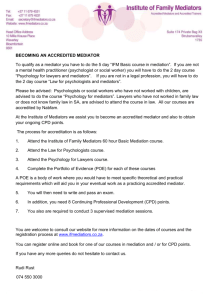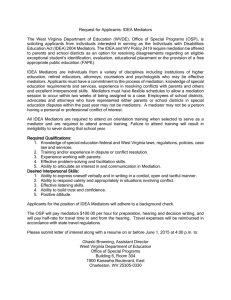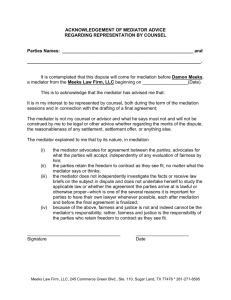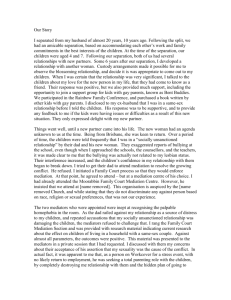E Campus Mediators and Civil Liability by Jennifer L. Schulz
advertisement
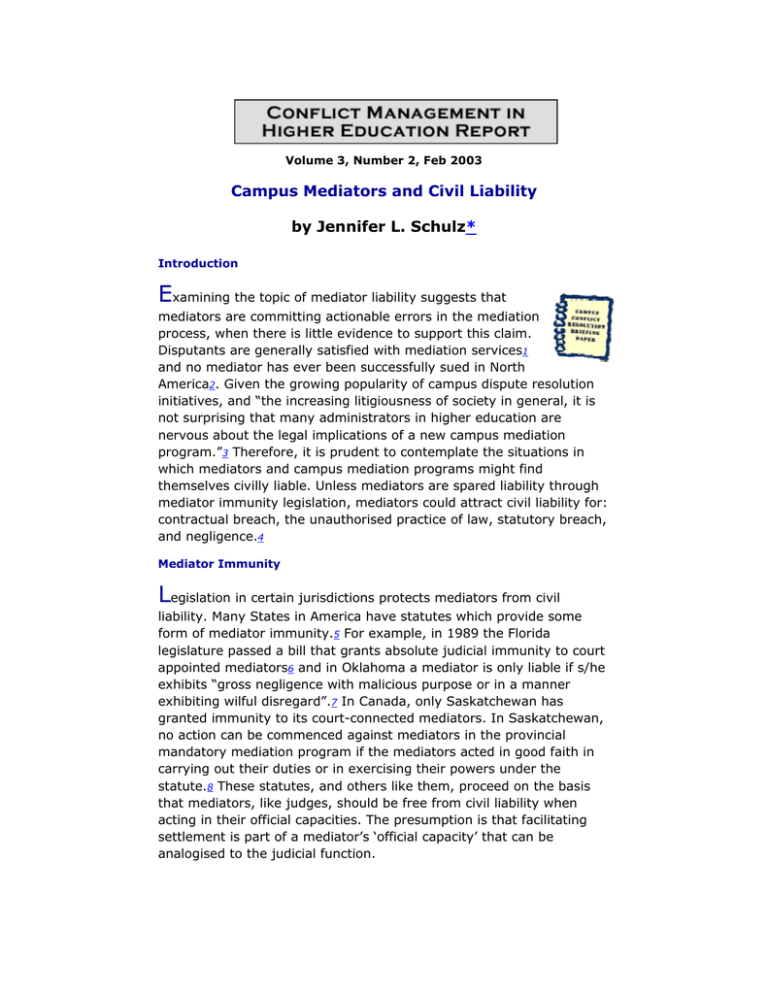
Volume 3, Number 2, Feb 2003 Campus Mediators and Civil Liability by Jennifer L. Schulz* Introduction Examining the topic of mediator liability suggests that mediators are committing actionable errors in the mediation process, when there is little evidence to support this claim. Disputants are generally satisfied with mediation services1 and no mediator has ever been successfully sued in North America2. Given the growing popularity of campus dispute resolution initiatives, and “the increasing litigiousness of society in general, it is not surprising that many administrators in higher education are nervous about the legal implications of a new campus mediation program.”3 Therefore, it is prudent to contemplate the situations in which mediators and campus mediation programs might find themselves civilly liable. Unless mediators are spared liability through mediator immunity legislation, mediators could attract civil liability for: contractual breach, the unauthorised practice of law, statutory breach, and negligence.4 Mediator Immunity Legislation in certain jurisdictions protects mediators from civil liability. Many States in America have statutes which provide some form of mediator immunity.5 For example, in 1989 the Florida legislature passed a bill that grants absolute judicial immunity to court appointed mediators6 and in Oklahoma a mediator is only liable if s/he exhibits “gross negligence with malicious purpose or in a manner exhibiting wilful disregard”.7 In Canada, only Saskatchewan has granted immunity to its court-connected mediators. In Saskatchewan, no action can be commenced against mediators in the provincial mandatory mediation program if the mediators acted in good faith in carrying out their duties or in exercising their powers under the statute.8 These statutes, and others like them, proceed on the basis that mediators, like judges, should be free from civil liability when acting in their official capacities. The presumption is that facilitating settlement is part of a mediator’s ‘official capacity’ that can be analogised to the judicial function. The American position on mediator immunity has been solidified in case law. The two most important cases grant immunity to a psychologist for behaviour committed during a custody and access intervention, and to a case evaluator for actions taken in an ADR process. In the first case, Howard v. Drapkin,9 the defendant psychologist was hired by the plaintiff to assist the plaintiff’s family in a child custody and visitation dispute. In the course of her intervention, the defendant psychologist stretched a one and a half hour session into a six hour session, accused the plaintiff of lying, failed to include material information in her written report, misrepresented what the child’s doctors had said, failed to disclose a prior professional relationship with the plaintiff’s husband, and failed to disclose that she was a close personal friend of the wife of one of the partners in the firm that represented the plaintiff’s husband in the underlying action. The plaintiff sued the psychologist but the Court of Appeal found that because the psychologist acted as a neutral trying to effect resolution of a family dispute, the psychologist was “…entitled to the protection of quasi-judicial immunity for the conduct of such dispute resolution services”.10 Quasi-judicial immunity was therefore extended to a non court supervised, voluntarily selected, and privately compensated psychologist. Although the court acknowledged “alleged offensive and dishonest communicative acts”11 on the part of the psychologist, the statutory privilege protected the defendant psychologist from civil liability. Campus mediators would, however, be unlikely to benefit from similar protection. This is because Howard v. Drapkin concerned a statutorily-protected psychologist intervening in a custody and access dispute, and most campus mediators are neither statutorily-protected, psychologists, nor working on custody and access matters. In the second American case, Wagshal v. Foster,12 a case evaluator was granted immunity. In Wagshal v. Foster, the plaintiff’s case was referred to mandatory neutral case evaluation pursuant to a court rule, and Foster was appointed the case evaluator. Wagshal felt he had been made to settle against his will and thus that his recovery was far lower than if he had pursued his claim. Wagshal sued Foster, alleging his right to due process and a jury trial were denied by the appointment of Foster as case evaluator. The U.S. Court of Appeals for the District of Columbia assumed for the purpose of analysis that Foster breached his obligations of neutrality and confidentiality. However, the court held that absolute immunity extended to Foster as a court-appointed case evaluator acting within the scope of his official duties. The court followed the three step test developed in Butz v. Economou13 and decided that Foster should be protected by quasijudicial immunity. According to Butz, the court must first determine whether the functions of the neutral in question are comparable to those of a judge. Based on Butz, American courts have found the functions comparable: “…the general process of encouraging settlement is a natural, almost inevitable, concomitant of adjudication.”14 Secondly, the Butz test requires American courts to examine whether the nature of the controversy is intense enough that future harassment or intimidation from the disputants is likely for the mediator. Finally, Butz calls for an answer to the question whether there are safeguards adequate to justify dispensing with private damage suits. Although the court in Wagshal v. Foster found that all three steps of the Butz inquiry were satisfied, the test is not made out in the campus context. Firstly, the functions of campus mediators are not comparable to those of judges. Not only is encouraging settlement not inevitably part of adjudication, but campus mediators do not judge, render decisions, nor perform any other adjudicatory functions. Thus, there is no valid reason to extend immunity to them. Secondly, given that campus mediators do not render decisions, the likelihood of harassment is minimal. While it is true that a disgruntled disputant could cause considerable pain on campus by badmouthing a campus mediator or mediation service, the fear of negative publicity does not merit shielding an unregulated practitioner from civil liability. Finally, other than faculty supervision, there are no formal procedures on most North American campuses to monitor mediator conduct, and thus, campus mediator immunity based on the Butz test is not supportable. Given that immunity for campus mediators is unlikely unless created by statute, campus mediators and mediation programs should be aware that they could attract civil liability for contractual breach, the unauthorised practice of law, statutory breach, and negligence. Contractual Breach Most campus mediators do not commence mediation unless disputants have signed a contract to mediate or terms of mediation. However, despite the proliferation of mediation contracts, no mediator has yet been successfully sued on a contract to mediate. There have been no reported suits against Canadian or American mediators for breach of contract,15 despite the fact that “legally enforceable standards for practice can be established by contract between the mediator and the mediation participants.”16 North American common law implies a term into all contracts, which includes contracts to mediate, that all services contracted for will be provided competently.17 Thus, mediators are in breach of their contracts to mediate if they fail to provide competent service, and disputants are entitled to sue them for their provable damages. If mediators wish to escape contractual liability they must adhere to all terms of their contracts to mediate. It is essential that disputants are not promised more than mediation can deliver. If a mediator makes an express or implied promise about the process or results of mediation, the mediator could be contractually liable if the process or results differ from what was promised. Thus, provided campus mediators maintain a purely facilitative role, leave all decision-making in the hands of the disputants, and adhere to the terms of their contracts to mediate, the possibility of civil liability is greatly reduced. If however the mediator breaches a term of the contract to mediate, for example by not maintaining the confidentiality of the mediation session, then liability for breach of contract could ensue. Many mediators promise that the mediation session will be completely confidential, but are not able to adhere to that promise.18 Campus mediators may be required to share the details of mediation sessions with faculty supervisors or other campus mediators, or write about mediation sessions they have participated in as evaluation components of their mediation programs. In other situations, for example in the case of suspected child abuse, disclosure or breach of confidentiality is often mandated by law. Thus, although no mediator has yet been successfully sued for breach of contract, campus mediators should be aware that if they promise to maintain disputant confidentiality in a contract to mediate, they could be civilly liable if they break that promise. It is possible to include waivers in agreements to mediate which limit or remove mediator liability for errors such as breach of confidentiality. However, as no cases have yet been tried in this area, it is unclear whether or not a waiver limiting liability would protect a campus mediator for breach of confidentiality. Campus mediators are encouraged to research the use of waivers in their jurisdictions, and to consider the purchase of liability insurance if their university’s general policy does not cover their mediation program. Unauthorised Practice of Law Another area of potential civil liability for campus mediators is liability for the unauthorised practice of law. Only lawyers are entitled to practice law in North America. If a campus mediator is also a lawyer, when practising mediation that mediator may not practice law.19 Thus, there are at least two areas of concern for campus mediators, especially those who are also lawyers: drafting the settlement agreement and advising disputants. Both of these activities may constitute the unauthorised practice of law. If a mediator merely records the disputants’ own words of agreement, the mediator is not practising law.20 However, if the mediator chooses her or his own language to draft a legally enforceable agreement, that may constitute the unauthorised practice of law. Lawyer-mediators who review mediated agreements with an eye toward their legal sufficiency have crossed the line and are likely practising law. In those cases, the lawyer-mediator could be sued qua lawyer, as opposed to qua mediator, thereby greatly increasing the likelihood of civil liability. In addition to drafting, advising can cause problems for campus mediators. If a mediator provides legal advice during mediation it may constitute the unauthorised practice of law. If campus mediators are deemed to be practising law by virtue of the fact that they are advising disputants, all of the standards of practice, legal and fiduciary duties that lawyers have toward clients could be imputed to those mediators, a consequence not likely to be favoured by most campus mediators, who are often students working on voluntary bases. There is one Canadian case that addresses the unauthorised practice of law in a mediation context. In R. v. Boldt,21 an Ontario paralegal was accused of carrying on the unauthorised practice of law in contravention of the Law Society Act.22 The court found that there was enough evidence to suggest that the paralegal may have been practicing law when she drafted a mediation agreement in a family dispute. As a result, it became open to the court to examine other instances of the paralegal’s alleged unauthorised practice of law, such as her pamphlets and past conduct. Thus, if a mediator is accused of the unauthorised practice of law, Canadian courts can examine the mediator’s past behaviour and documents in order to reach a decision. If a pattern of similar conduct exists, a conviction for the unauthorised practice of law is more likely. In the Boldt case, a new trial was ordered to determine whether the conduct alleged was actually the unauthorised practice of law. The decision of the court in the new trial is not yet known, so family mediators, and presumably campus mediators, must wait for a definitive answer to the question whether drafting enforceable mediation agreements constitutes the unauthorised practice of law in Ontario.23 In the United States, the question of mediator liability for the unauthorised practice of law is best represented by Werle v. Rhode Island Bar Association.24 In Werle, the court examined divorce mediation and civil rights in the context of the unauthorised practice of law.25 Werle was a psychologist and professor of psychology experienced in family mediation working in Rhode Island. Werle’s business was called ‘Werle Consultants Family Mediation Center’ and its services were described in a brochure. According to the brochure, the Center provided “impartial mediation and arbitration service for divorcing couples, assisting them in reaching agreement upon division of property, support and child custody.”26 The Rhode Island Bar Association and members of its former Committee on Unauthorised Practice of Law agreed that the brochure and the practice described probably violated Rhode Island’s laws. They sent Werle a letter requesting that he discontinue his divorce mediation business on the grounds that it involved him in the unauthorised practice of law. After reading the letter the Committee sent to him, Werle believed that the Committee on Unauthorised Practice of Law would recommend prosecution if he did not cease his practice. The Attorney General for Rhode Island refused to issue an opinion as to whether Werle’s practice constituted the unauthorised practice of law. So, Werle stopped mediating and sued the Rhode Island Bar Association and members of the Committee claiming they violated his First and Fourteenth Amendment rights to earn a living. The court held that even if it was the threat of prosecution that stopped Werle from offering divorce mediation services, allegedly in violation of laws prohibiting the unauthorised practice of law by non-lawyers, the Bar Association and its Committee were absolutely immune from damage liability under statute. Werle thus demonstrates an intolerance in the United States for mediators who assist parties in tasks, such as division of property, traditionally handled by lawyers. Thus, American campus mediation programs should ensure that they are not violating state laws or bar association rules when they engage in mediative tasks that could be construed as the unauthorised practice of family law. Statutory Breach Campus mediators, like anyone else, can be found liable if they breach a statute. While it is unlikely that many statutes will be directly applicable to campus mediators, there are examples of non-campus mediators being held liable for statutory breach. In Canada, mandatory mediation legislation has provided the basis for successful actions against roster mediators in Ontario.27 Several Ontario mandatory mediators have been found by courts to be in breach of rule 24.1 of Ontario’s civil procedure statute. For example, in Royal Bank of Canada v. Karrys and Karatzoulis et al.,28 it was held that if a mandatory mediator is assigned to mediate a court-connected case, the mediator must mediate in that particular judicial district. In the case the court sanctioned the mediator for his breach of statute by denying him his usual cancellation fee. Similarly, in Baliotis v. 1093707 Ontario Ltd. et al.,29 the court held that “it is inappropriate for a mediator on the Toronto roster to require the parties to travel out of Toronto to conduct a mediation, unless the parties consent to such other venue.”30 The mediator was censured for his statutory breach by removal from the case, and the mediation was conducted by a different mediator selected from the Toronto roster. Finally, in Riviera Properties Ltd. v. The Royal Bank of Canada and 1013164 Ontario Ltd.,31 the court held that mediators cannot conduct mediation through agents or over the telephone. “By explaining that the mediator had no authority to deviate from Rule 24.1.11(1), which mandates physical attendance, the court described improper mediator conduct.” 32 In the United States, a court found a social worker who provided quasi-mediative services liable for statutory breach in Horak v. Biris.33 In Horak, the defendant social worker held himself out as possessing expertise in counselling and in treatment of emotional and social problems. However, he mishandled the transference phenomenon common in counselling and had sexual relations with the wife during the course of the marital counselling. The Horak court noted that the Illinois legislature provides for revocation of social workers’ licenses if they are incompetent and that there is a code of ethics adopted by the National Association of Social Workers that would abhor this social worker’s conduct. The court noted that the public policy of the state could be gleaned from the statute, and the statute suggested that mental health professionals should not be shielded from the consequences of their actions.34 Thus, the statute, together with policy reasons to avoid shielding social workers from the consequences of their negligence, led the Illinois court to find the social worker liable for breach of statute. Finally, provincial, territorial, state, and federal business practice legislation could potentially ground campus mediator liability. Business practice legislation generally only applies in commercial settings, and it is doubtful that commercial relationships exist between volunteer campus mediators and disputants. However, some campus mediation services charge institutional or corporate disputants a fee, and in those cases, should be aware of the potential for business practice acts to ground liability.35 Taking Ontario’s Business Practices Act36 as an example, it is clear that a breach of the Act could lead to mediator liability, and might even provide evidence of negligence.37 The Business Practices Act states that an unconscionable consumer representation is an unfair practice,38 and that no person shall engage in an unfair practice.39 In order to determine whether a particular consumer representation is unconscionable, and therefore an unfair business practice, regard must be had to whether the person making the representation “knows or ought to know, i.that the consumer is not reasonably able to protect his or her interests because of physical infirmity, ignorance, illiteracy, inability to understand the language of an agreement or similar factors, ii. that the proposed transaction is excessively one-sided in favour of someone other than the consumer, iii. that the terms or conditions of the proposed transaction are so adverse to the consumer as to be inequitable, iv. that he or she is making a misleading statement of opinion on which the consumer is likely to rely to his or her detriment, v. that he or she is subjecting the consumer to undue pressure to enter into the transaction."40 Campus mediators operating on a fee-for-service basis in jurisdictions with similar business practices acts could certainly make unconscionable consumer representations and thereby engage in unfair practices. If a campus mediator knew that a disputant could not understand the language of the mediation, or if the campus mediator should have known that the mediation agreement was one-sided and mediated anyway, the campus mediator could be in breach of business practice legislation. If the campus mediator made a misleading statement upon which the disputant relied, or if the mediator pressured a party to settle, that mediator could be liable to pay a fine.41 Of course, if the mediator made a misleading statement, the mediator could also be liable for breach of the contract to mediate, as it is implied in all service contracts that services will be provided competently.42 If the disputant was induced to enter a mediated agreement due to an unfair practice or to a breach of contract, the agreement could be rescinded and damages could be payable.43 Therefore, if a campus mediator facilitated an agreement between two disputants, and it was established that one disputant settled due to reliance upon the mediator’s opinion, that mediator could be in breach of business practice legislation and/or contract law, the agreement could be rescinded, and the disputant could receive damages. If a court found that the breach of statute or breach of contract also constituted evidence of negligence, the campus mediator could face tortious liability as well. Negligence Campus mediators, like any other service provider, could be held tortiously liable if the three main elements of the tort of negligence are established: a duty of care must exist between the parties, there must be a breach of the standard of care, and provable damages must result.44 Campus mediators are in relationships of sufficient proximity to their disputants to satisfy the duty of care requirement, and there are no policy reasons that would mitigate against establishing a duty upon campus mediators to take reasonable care to avoid actions that could harm disputants. Establishing breach of the standard of care is however a more difficult hurdle to overcome. Because there are no uniform standards for mediation practice, the standard of care for mediators is unknown.45 And, if a different legal standard of care applies for campus mediators, we do not at this time know what it is.46 Consequently, it is difficult to establish breach of the standard of care and a causal connection between the breach and resulting damages in the mediation context. Indeed, no Canadian or American mediator has yet been held liable in negligence. Although there is no recognised tort of mediator malpractice in North America, there are cases that point to behaviour expected from mediators, and we may extrapolate from those cases to the campus mediation context. Two Canadian cases illustrate circumstances in which mediators could be held liable for negligence. In Walters v. Walters,47 Mrs. Walters requested that an uncle and former business partner of her husband act as mediator. The mediator was to assist Mrs. and Mr. Walters to arrive at a final settlement agreement of their property dispute. Both parties signed the draft agreement when it was brought to them individually by the mediator. However, Mrs. Walters argued that she only accepted the agreement because of representations made by the mediator as to the value of her ex husband’s assets, and those values were incorrect. The court found that Mr. Walters did not hide or misrepresent the value of his assets to the mediator, and therefore that the mediator made no misrepresentations to induce Mrs. Walters to sign the agreement. As a result, the mediated agreement between the parties was binding. Although the court in Walters v. Walters upheld the settlement agreement and did not find the mediator negligent, the court indicated that if a mediator made misrepresentations to induce disputant participation, that mediator would be negligent. This is a clear warning to Canadian campus mediators to be careful not to persuade disputants to attempt the process of mediation by exaggerating the process’ benefits, and to be wary of mediating with incomplete financial disclosure. In Martins v. Ali48 the court had the opportunity to explicate the duty of care for mediators, and thereby indicate when mediators would be liable in negligence, but it did not avail itself of that opportunity. Had it accepted the challenge of outlining proper mediation behaviour, the first jurisprudential articulation of mediator duty in Canada would be available. In Martins v. Ali, the plaintiff’s lawyer did not attend the mediation, and another lawyer, who did not appear to be briefed or instructed, attended instead. The mediator determined that this was inappropriate and raised the question “as to whether or not the plaintiff participated in good faith in the mediation.”49 Counsel argued that Ontario’s rules of civil procedure require good faith negotiations. While the Master found that suggestion “interesting”, he did not “rule on the extent of such a duty or…attempt to define it further.”50 This is unfortunate because the question of what constitutes mediator duty and therefore mediator negligence is left unanswered. We do not know whether Canadian mediators have a duty to ensure that disputants participate in good faith. Walters v. Walters and Martins v. Ali demonstrate that while courts are beginning to articulate what mediators should not do, they are reluctant to outline what mediators must do. It appears to be simpler to sanction procedural shortcomings than it is to substantively establish mediator negligence. In the United States, Lange v. Marshall51 illuminates when a mediator might be held liable in negligence. In Lange v. Marshall, the defendant, a lawyer, was a close personal friend of the plaintiff and her husband. The plaintiff and her husband decided to divorce after 25 years of marriage, and each separately approached the defendant for legal advice. The defendant advised that he would not represent one against the other, but if they could agree on terms of dissolution, he would prepare the necessary papers to dissolve their marriage. The plaintiff was ill with lupus and depressed due to her marital difficulties. She admitted herself to the psychiatric ward of a hospital. The defendant held a conference at the hospital with Mrs. and Mr. Lange and the terms of a settlement stipulation were agreed to. The plaintiff signed the stipulation the day she left the hospital, it was filed the next day, and the petition for dissolution was heard by a judge four days later. The judge took the matter under submission and stated that he would not enter judgment for thirty days. Within those thirty days the plaintiff had second thoughts and sought legal counsel. Ten months later the matter was settled more favourably for the plaintiff. The plaintiff therefore sued the defendant in negligence, alleging that the defendant failed to: (1) inquire as to the financial state of her husband and to advise her; (2) negotiate for a better settlement for her; (3) advise her that she would get a better settlement if she litigated the matter; and (4) fully and fairly disclose her rights as to marital property, custody and maintenance. 52 The defendant admitted that he did none of the four things the plaintiff complained about and argued he had no duty to do them. He stated that because he undertook to work as a mediator it would be improper for him to do any of the four things claimed to be negligence. Surprisingly, the Missouri Court of Appeals, for the purpose of decision-making, assumed that the defendant did have a duty to do the four things the plaintiff alleged, and that he breached that duty and was therefore negligent.53 The fact that the court was prepared to say that those four failings on the part of someone purporting to be a mediator could be negligence runs counter to current understandings of proper facilitative mediation practice. This assumption, if used as a starting point to help identify the legal duties of a campus mediator and what might constitute mediator malpractice, would radically alter the conventional understanding of facilitative mediation. The overwhelmingly consensus in the North American mediation community is that facilitative campus mediators are not to: judge what a ‘good’ settlement might be, advise disputants, nor commit the unauthorised practice of law by informing disputants of their legal rights. Therefore, Lange v. Marshall, a 1981 decision that radically conflicts with current understandings of facilitative mediation, is unlikely to be followed by a North American court today. Finally, there may be a duty upon campus mediators and programs in the United States to warn. In Tarasoff v. Regents of the University of California54 the plaintiff’s daughter was murdered by a psychiatric patient. The patient was being treated by a therapist employed by the university. The patient had confided his intentions to kill the plaintiff’s daughter to the therapist, and the therapist did not warn the woman. The court found that if a therapist determines that a patient presents a serious danger to another, the therapist incurs an obligation to use reasonable care to protect the intended victim; the therapist has a duty to warn. Thus, based on Tarasoff, it is arguable that a duty to warn could be imposed on American campus mediators. “Whenever a program is aware of a participant’s propensity to do harm, it has a duty to take reasonable steps to prevent the person from doing so.” 55 Conclusion An examination of civil liability for campus mediators reveals that the only campus mediators that might be spared liability would be those mediating in American States where mediator immunity legislation protects non court-connected mediators. All other North American mediators could attract civil liability for contractual breach, the unauthorised practice of law, statutory breach and negligence. No mediator has yet been sued for breach of contract, but one Canadian paralegal-mediator has been prosecuted for the unauthorised practice of law,56 and one American psychologist was required to stop his mediation practice because it may have constituted the unauthorised practice of law.57 The number of reported cases of mediators breaching statutes is small, and none of the reported cases appear to be directly relevant to mediators mediating in campus programs. While to date no North American mediator has been found liable in negligence, when standards of care are established, negligence will be the most likely avenue of redress for substandard campus mediation service. Due to variations in provincial, territorial, state, and federal laws, it is recommended that campus mediation programs research civil liability in their particular jurisdictions, and seek independent legal advice when in doubt. References Author Jennifer Schulz is Assistant Director, LL.M. in ADR Program, Osgoode Hall Law School, York University and Doctoral Candidate, Faculty of Law, University of Toronto. The author gratefully acknowledges CCH Canadian Limited for allowing her to use her chapter, “Civil Liability for Mediators” in A.J. Stitt, ed., Alternative Dispute Resolution Practice Manual, (Toronto: CCH Canadian Limited, 2002) at 8561, as the basis for this brief. 1. L. Boulle and K.J. Kelly review a number of Australian, American and Canadian studies on mediation effectiveness and note that all studies confirm that disputants report “high levels” of user satisfaction with both the process and outcome of mediation. See: Mediation: Principles, Process, Practice, (Markham, Ont.: Butterworths Canada Ltd., 1998) at 271-272. However, an empirical study of the campus mediation program at the State University of New York at Albany found that, “[i]nitially, the client’s perceptions are generally positive but they become neutral or slightly negative in the long run. Thus, as time passes, positive feelings diminish.” (Miller, Keith, “The Effectiveness of Mediation in Higher Education” (1987) 3 Journal on Dispute Resolution 187 at 202). Therefore, it is possible that dissatisfied campus mediation users may sue campus mediators or mediation programs. 2. J.L. Schulz, “Mediator Liability in Canada: An Examination of Emerging American and Canadian Jurisprudence” (2001), 32 Ottawa L. Rev. 269. 3. W.C. Warters, Mediation in the Campus Community, (San Francisco, CA: Jossey-Bass Inc., 2000) at 140. 4. Mediators, and other campus conflict managers, could also be sued for: conflict of interest, tortious interference with business relations, breach of neutrality, libel, giving incorrect advice, fraud, false advertising, and breach of fiduciary duty. (See G. Hufnagle, “Mediator Malpractice Liability” (1989), 23 Mediation Quarterly 33). Also, organisations such as the American Association of University Professors [“AAUP”], which helps to resolve disputes between educators and administrators, could face civil liability for substandard practice. For a general overview of the AAUP, see C.C. Russell, “Alternative Dispute Resolution in the University Community: The Power and Presence of the American Association of University Professors (AAUP)” (1988), 3 Journal on Dispute Resolution 437. 5. States with mediator immunity legislation include: California, Colorado, Connecticut, Florida, Hawaii, Iowa, Louisiana, Maine, Minnesota, Mississippi, Montana, Nebraska, Nevada, New Jersey, North Carolina, North Dakota, Oklahoma, Utah, Virginia, Washington, Wisconsin, and Wyoming. 6. Fla. Stat. Ann. Tit. 5, § 44.107 [formerly § 44.307 (1989)]. 7. Okla. Stat. Ann., Tit. 12, § 1805(E). 8. The Queen’s Bench (Mediation) Amendment Act, S.S. 1994, c. 20, s. 54.4, and The Queen’s Bench Revision Act, S.S. 1998, c. Q-1.01, s. 44. 9. 271 Cal. Rptr. 893, 222 C.A. 3d 843 (Cal. App. 2 Dist. 1990), [“Howard v. Drapkin”]. 10. Howard v. Drapkin at 894. 11. Howard v. Drapkin at 896. 12. 28 F. 3d 1249, 307 U.S. App. D.C. 382 (D.C. Cir. 1994), [“Wagshal v. Foster”]. 13. 438 U.S. 478 (1978), 57 L. Ed. 2d 895, 98 S.Ct. 2894, [“Butz”]. 14. Wagshal v. Foster at 1252. 15. J.L. Schulz, “Mediator Liability in Canada: An Examination of Emerging American and Canadian Jurisprudence” (2001), 32 Ottawa L. Rev. 269. 16. A.E. Barsky, “A Lawyer’s Guide to Mediation Use: An Unauthorized Sequel” (1993), 31 Fam. and Conciliation Cts. Rev. 376 at 378. 17. See for example, Central Trust Co. v. Rafuse, [1986] 2 S.C.R. 147, 31 D.L.R. (4th) 481, 37 C.C.L.T. 117 (SCC). 18. J.L. Schulz, “Mediation, Confidentiality, and Settlement Privilege: The Practitioner’s Dilemma” (1999), 26 Man. J. of Counselling 8. 19. See F. Furlan, E. Blumstein, and D.N. Hofstein, “Ethical Guidelines for Attorney-Mediators: Are Attorneys Bound by Ethical Codes for Lawyers When Acting as Mediators?” (1997), 14 J. Am. Acad. Matrim. L. 267; J.R. Schwartz, “Laymen Cannot Lawyer, But is Mediation the Practice of Law?” (1999) Cardozo L. Rev. 1715; and Rule 4.07 of the Rules of Professional Conduct, promulgated by the Law Society of Upper Canada. 20. F. Furlan, E. Blumstein, and D.N. Hofstein, “Ethical Guidelines for Attorney-Mediators: Are Attorneys Bound by Ethical Codes for Lawyers When Acting as Mediators?” (1997), 14 J. Am. Acad. Matrim. L. 267 at 318. 21. [1996] O.J. No. 4723 (Ont. Ct. J.), online: QL (OJ), [“Boldt”]. 22. R.S.O. 1990, c. L.8, s. 50(1). 23.Although R. v. Boldt has come to the Ontario Court of Appeal on a motion, the Provincial Court process remains uncompleted. See R. v. Boldt (January 17, 1997), Toronto CA M19721 (Ont. C.A.), online: 1997 CarswellOnt 1205. 24. 755 F.2d 195 (1985), [“Werle”]. 25. The Werle discussion comes from J.L. Schulz, “Mediator Liability in Canada: An Examination of Emerging American and Canadian Jurisprudence” (2001), 32 Ottawa L. Rev. 269 at 281. 26. Werle at 196. 26. Werle at 196. 27. Rules of Civil Procedure, R.R.O. 1990, Reg. 194 as amended, rule 24.1. Rule 24.1 creates Ontario’s Mandatory Mediation Program [“OMMP”]. The OMMP is a court-connected, casemanaged, civil, non-family, fee-for-service mediation program, established in Ottawa, Toronto, and Windsor. 28. (July 21, 1999), Toronto 99-CV-165461CM (Ont. S.C.J.), online: LEXIS (Canada, CANCAS). 29. (January 14, 2000), Toronto 99-CV-162060CM (Ont. S.C.J.), online: LEXIS (Canada, CANCAS). 30. (January 14, 2000), Toronto 99-CV-162060CM (Ont. S.C.J.), online: LEXIS (Canada, CANCAS) at 1. 31. (October 28, 1999), Toronto 99-CV-9976CM (Ont. S.C.J.), online: LEXIS (Canada, CANCAS). 32. J.L. Schulz, “Mediator Liability in Canada: An Examination of Emerging American and Canadian Jurisprudence” (2001) 32 Ottawa L. Rev. 269 at 293. 33. Horak v. Biris, 474 N.E. 2d 13, 130 Ill. App. 3d 130 (Ill. App. 2 Dist. 1985), [“Horak”]. The Horak discussion comes from J.L. Schulz, “Mediator Liability in Canada: An Examination of Emerging American and Canadian Jurisprudence” (2001), 32 Ottawa L. Rev. 269 at 289-290. 34. Horak at 19. 35. For example, the University of Windsor Mediation Service, a campus mediation service operated out of the Faculty of Law, University of Windsor, Canada, conducts condominium disputes on a fee-for-service basis. 36. R.S.O. 1990, c. B.18. 37. In R. in Right of Canada v. Saskatchewan Wheat Pool, [1983] 1 S.C.R. 205, (1983) 143 D.L.R. (3d) 9 (SCC), the Supreme Court of Canada held that while breaching a statute is not negligence per se, breaching a statute may be evidence of negligence. 38. R.S.O. 1990, c. B.18 at s. 2. 39. R.S.O. 1990, c. B.18 at s. 3(1). 40. R.S.O. 1990, c. B.18 at s. 2(2). 41. R.S.O. 1990, c. B.18 at s. 17(2): “Every person who engages in an unfair practice…knowing it to be an unfair practice is guilty of an offence and on conviction is liable to a fine of not more than $25 000 or to imprisonment for a term of not more than one year, or to both.” 42. Central Trust Co. v. Rafuse, [1986] 2 S.C.R. 147, 31 D.L.R. (4th) 481, 37 C.C.L.T. 117 (SCC). 43. R.S.O. 1990, c. B.18 at s. 4(1). 44. M'Alister (or Donoghue) v. Stevenson, [1932] All E.R. 1, [1932] A.C. 562 (H.L.). Campus mediation programs and indeed even supporting universities could also be held vicariously liable for the negligence of campus mediators. 45. Standards of care for mediators might be gleaned from mediator codes of conduct, such as those promulgated by the Association for Conflict Resolution [“ACR”] and Conflict Resolution Network Canada [“The Network”]. These codes indicate that certain minimum standards of professional conduct exist for mediators, so campus mediators would be advised to adhere to them. However, ACR’s code and The Network’s code do not have legal effect unless and until they are adopted in a court of law. A legal foundation must be established in order to develop standards of care for mediators from current codes of conduct. See J.L. Schulz, “Mediator Liability: Using Custom to Determine Standards of Care” (2002) 65 Sask. L. Rev. 163, which recommends the tort law concept of custom as the foundation upon which to develop standards of care for mediators. 46. For sample practice guidelines established by campus mediation programs, see W.C. Warters, Mediation in the Campus Community (San Francisco, CA: Jossey-Bass Inc., 2000) at 249-252. These guidelines, which promote good campus mediation practice, do not as of yet have legal force. With the continent-wide acceptance of the Guidelines for Conflict Management in Higher Education developed under the direction of William C. Warters, there will eventually be uniform, authoritative guidelines for campus mediators. These guidelines could, in turn, provide the legal foundation for a campus mediator standard of care and thus negligence liability for campus mediators could be more easily proven. 47. (1985) 45 R.F.L. (2d) 245, [1985] O.J. No. 1159 (Ont. H.C.), [“Walters v. Walters”]. 48. (December 17, 1999), Toronto 99-CV-170916CM (Ont. S.C.J.), [“Martins v. Ali”]. 49. Martins v. Ali at 1. 50. Martins v. Ali at 1. 51. 622 S.W. 2d 237 (Mo. App. 1981), [“Lange v. Marshall”]. The Lange v. Marshall discussion comes from J.L. Schulz, “Mediator Liability in Canada: An Examination of Emerging American and Canadian Jurisprudence” (2001), 32 Ottawa L. Rev. 269 at 286-288. 52. Lange v. Marshall at 238. 53. Despite the fact that the court said in theory there was mediator negligence, the court did not hold the defendant liable. Because the plaintiff did not sustain any damage as a proximate result of the defendant’s negligence, the defendant was not liable (Lange v. Marshall at 238). In other words, Mrs. Lange could not prove that ‘but for’ the mediator’s alleged negligence, her litigation-related expenses would not have occurred. 54. 17 Cal. 3d 425 (1976), [“Tarasoff”]. 55. W.C. Warters, Mediation in the Campus Community, (San Francisco, CA: Jossey-Bass Inc., 2000) at 143. 56. R. v. Boldt, [1996] O.J. No. 4723 (Ont. Ct. J.), online: QL (OJ). 57. Werle v. Rhode Island Bar Association, 755 F.2d 195 (1985).
